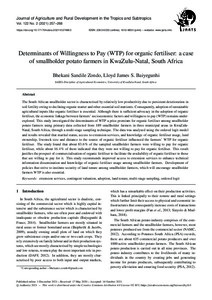| dc.date.accessioned | 2021-12-03T14:44:57Z | |
| dc.date.available | 2021-12-03T14:44:57Z | |
| dc.date.issued | 2021-12-01 | |
| dc.identifier | doi:10.17170/kobra-202110274963 | |
| dc.identifier.uri | http://hdl.handle.net/123456789/13420 | |
| dc.language.iso | eng | eng |
| dc.rights | Namensnennung 4.0 International | * |
| dc.rights.uri | http://creativecommons.org/licenses/by/4.0/ | * |
| dc.subject | extension services | eng |
| dc.subject | contingent valuation | eng |
| dc.subject | adoption | eng |
| dc.subject | land tenure | eng |
| dc.subject | multi-stage sampling | eng |
| dc.subject | ordered logit | eng |
| dc.subject.ddc | 630 | |
| dc.title | Determinants of Willingness to Pay (WTP) for organic fertiliser: a case of smallholder potato farmers in KwaZulu-Natal, South Africa | eng |
| dc.type | Aufsatz | |
| dcterms.abstract | The South African smallholder sector is characterised by relatively low productivity due to persistent deterioration in soil fertility owing to declining organic matter and other essential soil nutrients. Consequently, adoption of sustainable agricultural inputs like organic fertiliser is essential. Although there is sufficient advocacy in the adoption of organic fertiliser, the economic linkage between farmers' socioeconomic factors and willingness to pay (WTP) remains under-explored. This study investigated the determinants of WTP a price premium for organic fertiliser among smallholder potato farmers using primary data collected from 189 smallholder farmers in three municipal areas in KwaZulu-Natal, South Africa, through a multi-stage sampling technique. The data was analysed using the ordered logit model and revealed that marital status, access to extension services, and knowledge of organic fertiliser usage, land ownership, livestock size and distance to the source of organic fertiliser influenced the farmers’ WTP for organic fertiliser. The study found that about 83.6% of the sampled smallholder farmers were willing to pay for organic fertiliser, while about 16.4% of them indicated that they were not willing to pay for organic fertiliser. This result justifies the prospect of commercialisation of organic fertiliser to facilitate the availability of organic fertiliser to those that are willing to pay for it. This study recommends improved access to extension services to enhance technical information dissemination and knowledge of organic fertiliser usage among smallholder farmers. Development of policies that strive to institute security of land tenure among smallholder farmers, which will encourage smallholder farmers WTP is also essential. | eng |
| dcterms.accessRights | open access | |
| dcterms.creator | Zondo, Bhekani Sandile | |
| dcterms.creator | Baiyegunhi, Lloyd James Segun | |
| dc.subject.swd | Südafrika | ger |
| dc.subject.swd | KwaZulu-Natal | ger |
| dc.subject.swd | Kartoffelbau | ger |
| dc.subject.swd | Kleinbauer | ger |
| dc.subject.swd | Organisches Düngemittel | ger |
| dc.subject.swd | Contingent Valuation | ger |
| dc.subject.swd | Grundeigentum | ger |
| dc.subject.swd | Zahlungsbereitschaft | ger |
| dc.type.version | publishedVersion | |
| dcterms.source.identifier | eissn:2363-6033 | |
| dcterms.source.issue | No. 2 | |
| dcterms.source.journal | Journal of Agriculture and Rural Development in the Tropics and Subtropics (JARTS) | eng |
| dcterms.source.pageinfo | 257-268 | |
| dcterms.source.volume | Vol. 122 | |
| kup.iskup | false | |


